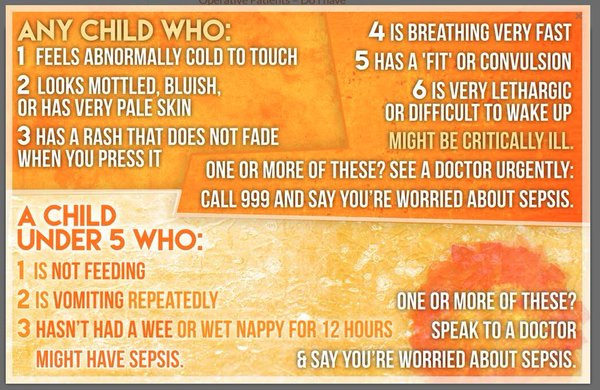Spotting Sepsis
Health
Spotting Sepsis
Sepsis as been in the news recently following the enquiry into the extremely sad death of a young boy, when some tell tale signs of the illness was missed by GPs and the 111 Service.
Over 37,000 people in the UK die from Sepsis every year and many more people are affected; its effects are devastating.
Sepsis is a life threatening condition that happens when the body’s response to an infection damages its own tissues and organs. Severe Sepsis leads to shock, the body’s organs fail and the casualty may die. It is vitally important to recognise symptoms early and treat promptly. One of the most common ways of developing Sepsis is following an operation or injury where the wound becomes infected, or as a secondary infection following an illness such as a chest infection or septic throat.
Always regularly check a wound site following an injury or surgical procedure. If the wound becomes hot, itchy, swollen or red then you should seek medical advice promptly.
Possible Signs and Symptoms of Sepsis
Unfortunately Sepsis can be a difficult condition to recognise and often takes a while to diagnose as early symptoms are similar to flu and other common illnesses, but they are also similar to those associated with Meningitis. There is a major campaign to raise awareness of possible early signs as the sooner it is identified and treatment started the better the outcome for the patient.
There are 6 key signs and symptoms that we are encouraged to look out for and they are;
Slurred Speech
Extreme Shivering or Muscle Pain
Passing No Urine (in a day)
Severe Breathlessness
I Feel Like I Might Die
Skin Mottled or Discoloured
The Sepsis Trust has issued the guidance below to help parents and child carers quickly recognise the signs and symptoms in children.

When to go to hospital
If someone is getting worse and you are seriously concerned or if they are extremely unwell and have some of the above symptoms don't hesitate in getting them to casualty as soon as you can.
If you are sent home from the hospital or GP Surgery and the casualty gets worse, return to the hospital. Trust your instincts and tell them you are worried!
If you are unsure of what to do in a medical emergency please book onto a First Aid course or you can brush up on essentials with an online course from www.onlinefirstaid.com, emma@firstaidforlife.org.uk or call 020 8675 4036 for more information.
First Aid for life provides this information for guidance and it is not in any way a substitute for medical advice. First Aid for Life is not responsible or liable for any diagnosis made, or actions taken based on this information.
Related Articles
Dragons launches new nursery fabrics
First Aid training - Why knowing what to do is so important
Preventing and treating poisining with First Aid For Life
Crash Course in A & E Paediatric First Aid for Parents
Firework Advice and First Aid tips should something go wrong
A bright Montessori future in Brooke Green
Helmets - can they really save lives?
What we all should know about Asthma
Why first aid skills are important for older children and teenagers
Vital first aid tips for Fireworks
What to do when a child is choking
Halloween and Bonfire Night First Aid Tips
Related Products
Have Your Say
Be the first person to comment on this article, just post a comment below.





In order to post a comment you need to be a member. Join Now | Sign in